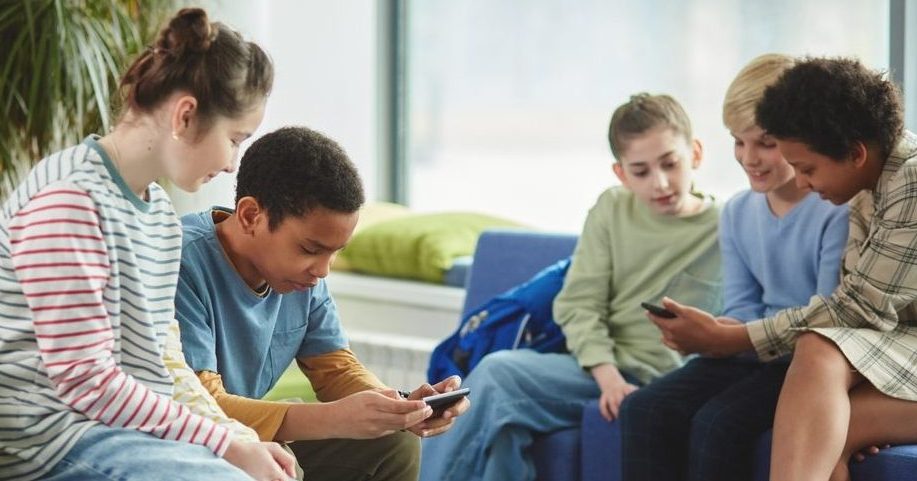The promotion of media literacy is a focal point of our commitment besides the protection of children and young people from harmful online media. Therefore, we support parents, teachers and adolescents through various media education offers to use digital media safely and self-confidently.
We aim at encouraging adolescents to actively participate in shaping the digitalised society and to protect them from the equally diverse potential dangers at the same time. Parents and educational professionals must also be supported in their responsibility to accompany and protect children and adolescents. As a relevant player in the media education landscape, the FSM is represented in numerous cooperations, expert committees, round tables, on panel discussions and further training offers.
Would you like more information?
Contact the FSM team!
Lidia de Reese
Senior Manager Media Literacy
Tel: +49 (0) 30 24 04 84 42
E-Mail: dereese@fsm.de
Jo Loreen Schuler
Senior Manager Media Literacy
Tel: +49 (0) 30 24 04 84 48
E-Mail: schuler@fsm.de
Parents and families
Balancing between guiding, supporting,
supervising and protecting
When children discover and eventually use digital media, families are faced with a multitude of questions and responsibilities. It is important to carefully combine and balance between protection and education: On the one hand, online media offer adolescents many opportunities; on the other hand, they can confront them with risks.
Know-how for parents and educators
We support parents and educators with easily accessible information and materials to help children and young people grow up with digital media in an age-appropriate, individual and needs-oriented way.

Elternguide.online
Elternguide.online is supporting parents in their media education efforts within families and helps them guiding their children’s use of apps, games, websites and social networks.
No two families are the same, every child and every family is unique. Therefore, we offer age-differentiated and needs-oriented access to the numerous information and examples on Elternguide.online. We take parents and their individual situation seriously and offer advice not in a lecturing manner – and thus want to stimulate a dialogue in families about online media use.
At a glance
- Answers to parents’ questions on media use by children and young people – in German and English
- 450+ published articles in total
- 145+ tool descriptions on apps, services and platforms
- 20+ audio articles that parents can listen to
- 16 videos “Parents ask – we answer”
“Guiding and accompanying children through their online experiences is a challenging task. With Elternguide.online it is guaranteed to become easier.“
Martin Drechsler, FSM Managing Director

Checklist: Criteria for positive online content for children
Which online content and services are suitable for children? Parents and educators find guidance and support in the checklist from the Better Internet for Kids initiative. Online content and services providers can also use the checklist to ensure developing and designing age-appropriate websites, apps, online games, etc.
Teachers and educational professionals
Promoting competences in the digital world:
Media literacy in schools and education
Many teachers and educational professionals still face challenges in using digital applications in teaching and educational settings. At the same time, the need for dealing with central aspects of online media use and its risks such as communication, interaction or problematic content in the classroom and in extracurricular, pedagogical institutions is continuously increasing.
To meet these requirements the FSM offers numerous suggestions, materials and further training opportunities to implement media education in lessons and educational contexts. We offer free and open access to all our educational materials (open educational resources), which can be used, shared and adapted under free licences.
Schools, extracurricular educational and counselling institutions can make use of ourdiverse information and materials. We are happy to advise on questions of digital media use and support the organisation of training events, lectures or workshops. Contact us!

“Media goes to School” – Materials for the classroom
The series of teaching materials Media goes to School offers numerous teaching suggestions, lesson plans and didactic tools on digital media.
They support teachers while guiding young people to use their favourite media safely and competently, raising awareness of risks and empowering pupils to possible courses of action. The materials are published under an open CC licence and can be downloaded and used free of charge.
A wide range of topics are covered: safety online, youth media protection, hate speech, disinformation and “fake news”, opinion forming, machine learning and much more.
At a glance
- 7 comprehensive teaching materials for media education
- 4 practice-oriented toolkits for the use of digital applications in face-to-face, hybrid and distance learning contexts
- For secondary school levels: graduated levels of difficulty, various discussion prompts, suggestions for extended exercises
- Methodological diversity and high flexibility in pedagogical use
“weitklick” – Educational programme against disinformation
Children and young people are increasingly coming across “fake news” and disinformation of all kinds. FSM’s weitklick project supports teachers in sustainably integrating the topic of disinformation in the digital space into the classroom.
With free online training courses, videos and teaching materials, teachers can learn how to address the topic of online disinformation and its impact on society as a whole with their pupils. The project’s aim is to promote critical thinking as well as media and news literacy.
The project was funded by Google.org until January 2024. Even after the official end of the project, teachers and educational specialists will continue to find helpful resources for media education on disinformation at weitklick.
At a glance
- Support for teachers at secondary school levels as well as in vocational education and training
- Online courses for individual self-learning
- Comprehensive collection of free videos and materials for everyday school practice
- Support for media education work with parents



